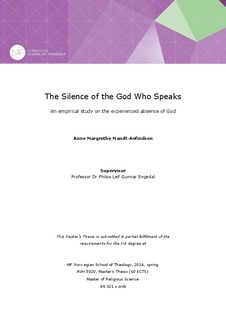The Silence of the God Who Speaks : an empirical study on the experienced absence of God
Master thesis
Permanent lenke
http://hdl.handle.net/11250/2413501Utgivelsesdato
2016-10-07Metadata
Vis full innførselSamlinger
Sammendrag
Through the ages, saints, poets, and regular people have experienced that their God becomes absent. It is described as darkness, periods of anguish, despair, fear, and sometimes as nothingness. But what – really – is that experience? In this thesis we search for answers that might help to shed some light on the experience of divine absence.
We have asked the following question: What are the characteristics, effects and understanding of the experience named “God’s absence”, as portrayed in the stories of persons with a personal relation to God?
I have attempted to answer this set of questions through qualitative in-depth interviews of six persons with a personal relation to God. The information withdrawn from the interviews is analyzed with STC (Systematic Text Condensation), and the empirical findings are read with theory in an abductive, hermeneutic process. I have used two main theoretical perspectives: object relations theory (Ana-Maria Rizzuto) and apophatic theology (Vladimir Lossky), as well as two supplementary perspectives from Christian spirituality traditions, as conveyed to us by Wilfrid Stinissen (and St. John of the Cross) and John Shea, respectively.
When considering our empirical findings in light of such theoretical perspectives, we might conclude as follows:
1) The absence experience is connected to ambivalent emotions; a desire for God, and a relief to be without God.
2) The experience of a leaving or disappearing God, can be adequately explained neither by reference to God’s essence nor to God’s (supposed) deliberate hiding. The hiding God is most often a rejected or suppressed God representation (that is: our complex inner image of God).
3) The absence experience might have its combined cause in concurrence of outer incidents and inner psychic assumptions and dispositions.
4) The absence experience might have transformational effects.
